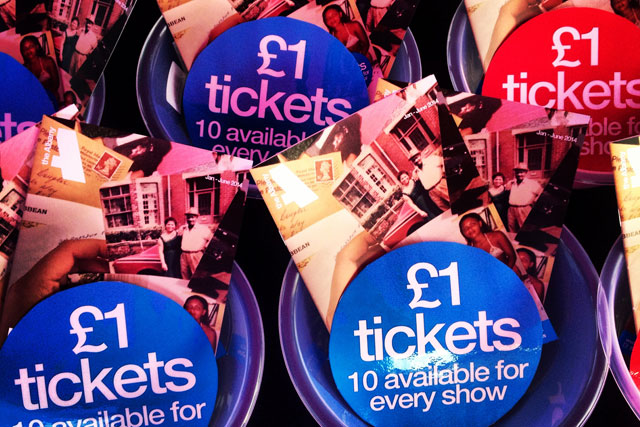Setting out its own pop-up box office in a market stall linked to the theatre’s CRM system, the Albany sold £1 tickets for its spring season on a first-come, first-served basis.
With ten tickets available for each show, the theatre sold almost the entire season’s allocation that day, with an estimated 70 per cent of those being first-time bookers, and around 60 per cent were based locally.
At a pound a ticket, it clearly wasn’t an exercise in boosting margins or quick incremental sales. In fact, the campaign was designed to deepen engagement with the local community, overcome brand misconceptions and drive first-time attendance.
Cloud technology helped the Albany be more nimble on the marketing front – moving from campaign idea to execution quickly, whilst tying in CRM and analytics to measure effectiveness and improve targeting.
But this isn’t really a technology story. It’s about a globally-respected UK cultural industry getting to grips with modern marketing techniques at the grassroots level – with characteristic British verve and creativity.
Busting myths about exclusivity.
The Albany has an outstanding history of engaging a diverse audience representative of its local demographic.
However, the organisation is constantly seeking innovative new ways to connect with local residents, and in particular, to bust myths that the arts are a middle-class redoubt, out of reach of the area’s working class and minority communities. The idea for the £1 ticket scheme came about following a conversation in Deptford Market.
Amber Massie-Blomfield, the Albany’s head of communications, said: "I got chatting to a lady with a young daughter who knew all about the Albany, but had never visited. She felt the risk of spending money on a ticket when she didn't know what to expect was too great.
"We had a free family event that Sunday, which I convinced her to attend. She arrived with her entire family and really enjoyed the experience. More importantly, she told us she'd be back."
The £1 ticket scheme was a direct result of that conversation. Seeing an opportunity to encourage locals to take a risk amounting to less than the price of a coffee, The Albany hoped to create opportunities for local community engagement that would drive first-time attendance and change perceptions of the theatre.
If £1 seems drastic as a pricing strategy, you have to consider the unique challenges of marketing in the arts sector, where ticket prices rarely reflect the true cost of staging a performance. While box office takings make up a significant chunk of revenue, most theatres generate income from a mix of sources – commercial, state, charitable and philanthropic.
This makes marketing performance a slightly more philosophical undertaking than purely private-sector consumer offers. Sales count, but it’s also about fairly reflecting the work of the artist; being clear about who you want to see the work, and how you want that work to be received.
How they did it
Convening a quick brainstorm session that afternoon, Massie-Blomfield and her team took inspiration from the market setting, where face-to-face engagement is the lifeblood of trading success.
Mixing old marketing approaches with new, they created a pop-up box office in the market, selling tickets from a bright pink stall on their Spektrix system, from wifi-connected laptops. Spektrix is a UK arts technology company, founded five years ago by a group of Cambridge students and now providing marketing and box office management software to more than 160 arts organisations around the UK.
Results
Two-thirds of the allocation was sold in person on the market stall on day one, with around 70% going to first-time bookers.
The campaign had an impact on regular ticket sales as well, with full-price tickets sales steadily climbing for shows where £1 tickets had sold out.
The Albany also had a 40% increase in website traffic while the campaign was running, more than 300 tweets, and generated a slew of positive news coverage in local and London press.
The scheme is a great example of innovative marketing tactics, technology enablement and audience engagement that more arts organisations need to embrace – mixing traditional and modern to connect with audiences and embed themselves more deeply across their natural demographic base.
Amber Massie-Blomfield added: "There are things we'll do differently next time and, with the benefit of solid analytics, we are looking at future offers for the local community better targeted to individuals."
"It’s hugely encouraging that many of the £1 ticket bookers have subsequently bought full-price tickets. The highlight for me however, was seeing the lady I'd spoken to in the market stall standing first in the queue to buy her tickets.
"A colleague saw her in Poundland that morning, talking up her Albany experience to a friend. You cannot buy that kind of word-of-mouth."
Libby Penn is a director at Spektrix ().


